
Arabic_for_Dummies
.pdf
176 Part II: Arabic in Action
Words to Know
taqriir |
tak-reer |
report |
taqriiraat |
tak-ree-rat |
reports |
niSf |
nee-sef |
half |
musaa’ada |
moo-sah-ah-dah |
help |
ghurfa |
goor-fah |
room |
‘ijtimaa’ |
eej-tee-mah |
meeting/ |
|
|
conference |
Suwar |
soo-war |
pictures |
bidaaya |
bee-dah-yah |
beginning |
nihaaya |
nee-hah-yah |
ending |
yaziid |
yah-zeed |
to add |
farraqa |
fah-rah-kah |
distribute |
jaahiz |
jah-heez |
ready (M) |
jaahiza |
jah-hee-zah |
ready (F) |
Taba’a |
tah-bah-ah |
to print |
nuskhaat |
noos-kat |
copies |
mumathil |
moo-mah-theel |
representative (M) |
mumathila |
moo-mah-thee-lah |
representative (F) |
mumathiliin |
moo-mah-thee-leen |
representatives |
|
|
(MP) |
mumathilaat |
moo-mah-thee-lat |
representatives |
|
|
(FP) |
‘iDHaafiy |
ee-zah-fee |
additional (M) |
‘iDHaafiyya |
ee-zah-fee-yah |
additional (F) |
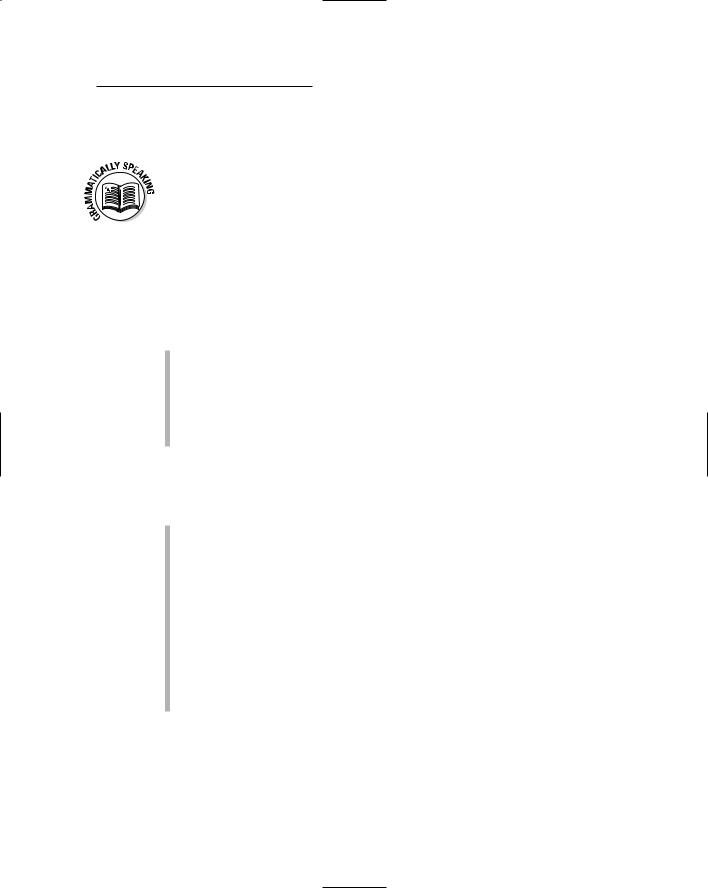
Chapter 10: At the Office and Around the House 177
Giving orders
The imperative verb form, also known as the command form, is used to give orders or directions. It’s an important verb to know in the workplace because that’s where you’re usually told what to do and where you tell others what to do. The imperative structure is fairly straightforward. This section shares some quick tips to allow you to master the imperative form.
First, because the imperative is a command form, you can use it only with present personal pronouns such as ‘anta (an-tah; you) (M) and ‘anti (an-tee; you) (F). You can’t used the imperative with absent personal pronouns such as huwa (hoo-wah; him) because you can’t give an order to someone who isn’t present. The following is a list of the personal pronouns to use with the imperative:
‘anta (an-tah; you) (MS)
‘anti (an-tee; you) (FS)
‘antum (an-toom; you) (MP)
‘antunna (an-too-nah; you) (FP)
‘antumaa (an-too-mah; you) (dual)
Second, the imperative form is nothing but a derived form of the regular verb in the maaDii (mah-dee; past) and the muDaari’ (moo-dah-reeh; present) tenses. The following is a list of the most common imperative verbs:
‘uktub (ook-toob; write)
‘iqra’ (eek-rah; read)
‘unDHur (oon-zoor; look)
‘a’id (ah-eed; repeat)
qull (kool; say)
‘u’kul (ooh-kool; eat)
takallam (tah-kah-lam; speak)
qif (keef; stop)
taHarrak (tah-hah-rak; move)
One of the more important verb command forms is the verb kataba (kah-tah- bah; to write). Table 10-1 shows the imperative (command form) of the verb kataba.
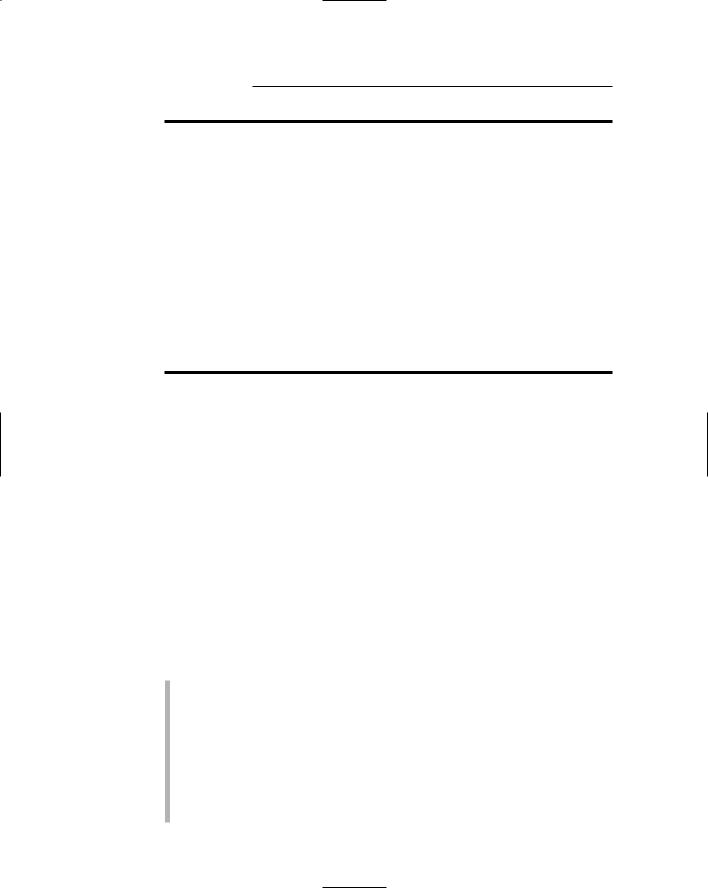
178 Part II: Arabic in Action
Table 10-1 |
Imperative Form of “Write” |
|
|
Pronoun |
Imperative |
Pronunciation |
Translation |
‘anta (you/MS) |
‘uktub |
ook-toob |
write (MS) |
|
|
|
|
‘anti (you/FS) |
‘uktubii |
ook-too-bee |
write (FS) |
|
|
|
|
‘antum (you/MP) |
‘uktubuu |
ook-too-boo |
write (MP) |
|
|
|
|
‘antunna (you/FP) |
‘uktubna |
ook-toob-nah |
write (FP) |
|
|
|
|
‘antumaa (dual) |
‘uktubaani |
ook-too-bah-nee |
write (dual) |
|
|
|
|
Another verb you should be aware of is the verb takallama (tah-kah-lah-mah; to speak). Table 10-2 shows the imperative form of the verb takallama.
Table 10-2 |
Imperative Form of “Speak” |
|
|
Pronoun |
Imperative |
Pronunciation |
Translation |
‘anta (you/MS) |
takallam |
tah-kah-lam |
speak (MS) |
|
|
|
|
‘anti (you/FS) |
takallamii |
tah-kah-lah-mee |
speak (FS) |
|
|
|
|
‘antum (you/MP) |
takallamuu |
tah-kah-lah-moo |
speak (MP) |
|
|
|
|
‘antunna (you/FP) |
takallamna |
tah-kah-lam-nah |
speak (FP) |
|
|
|
|
‘antumaa (dual) |
takallamaa |
tah-kah-lah-mah |
speak (dual) |
|
|
|
|
Supplying your office
In order to function properly and efficiently at the maktab, you need a number of different work-related items. Here are some common supplies you can expect to find at the maktab:
kursiiy (koor-see; chair)
maktab (mak-tab; desk)
‘aalat al-Hisaab (ah-lat al-hee-sab; computer)
haatif (hah-teef; telephone)
‘aalat al-faks (ah-lat al-fah-kes; fax machine)
maTba’a (mat-bah-ah; printer)
‘aalat al-Tibaa’ (ah-lat ah-tee-bah; photocopier)
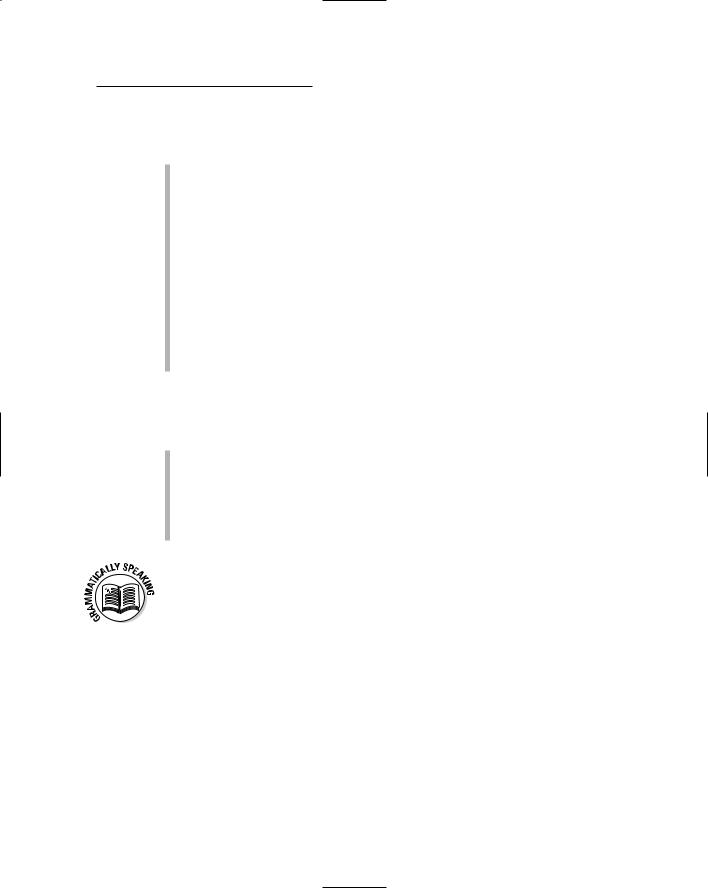
Chapter 10: At the Office and Around the House 179
Besides ‘aalaat (ah-lat; machines) and heavy furniture, you also need smaller tools to help you get by at the maktab:
qalam jaaf (kah-lam jaf; pen)
qalam ar-rasaas (kah-lam ah-rah-sas; pencil)
mimHaat (meem-hat; eraser)
kitaab (kee-tab; book)
daftar (daf-tar; notebook)
‘awraaq (aw-rak; papers)
mishbak ‘awraaq (meesh-bak aw-rak; paper clip)
Dammat ‘awraaq (dah-mat aw-rak; stapler)
liSaaq (lee-sak; glue)
skooch (seh-koo-tech; tape)
If you can’t find a daftar or liSaaq, ask a zumalaa’ if you can borrow one. Here’s how you ask a colleague a question, depending on whether you’re speaking to a man or a woman:
hal ‘indakii daftar? (hal een-dah-kee daf-tar; Do you have a notebook?) (F)
hal ‘indaka liSaaq? (hal een-dah-kah lee-sak; Do you have glue?) (M)
hal ‘indakum skooch? (hal een-dah-koom seh-koo-tech; Do you have tape?) (MP)
hal ‘indahu qalam? (hal een-dah-hoo kah-lam; Does he have a pen?)
The construct “to have” in Arabic isn’t a verb (see the preceding list of examples); rather it’s a combination of possessive suffix constructions added to the word ‘inda (een-dah), which is the best word in the language to denote possession. However, for all intents and purposes, you may use this construct — ‘inda followed by a possessive suffix — in the same way as you would a regular verb. Check out this prepositional phrase using all personal pronoun suffixes:
Pronoun |
Form |
Pronunciation |
Translation |
‘anaa |
‘indii |
een-dee |
I have |
‘anta |
‘indaka |
een-dah-kah |
You have (MS) |
‘anti |
‘indakii |
een-dah-kee |
You have (FS) |
huwa |
‘indahu |
een-dah-hoo |
He has |
hiya |
‘indahaa |
een-dah-hah |
She has |
naHnu |
‘indanaa |
een-dah-nah |
We have |
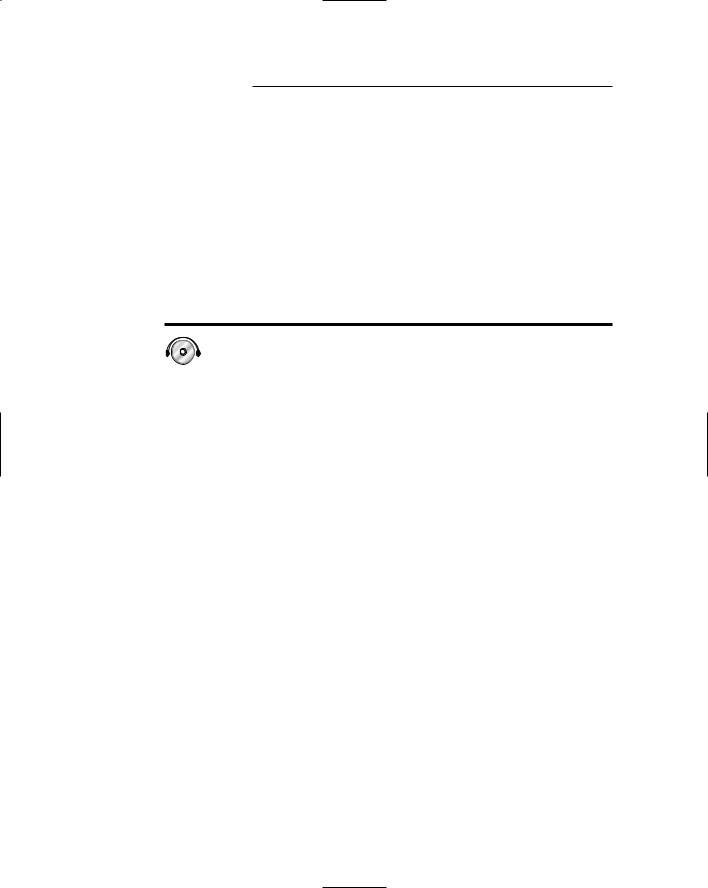
180 Part II: Arabic in Action
Pronoun |
Form |
Pronunciation |
Translation |
‘antum |
‘indakum |
een-dah-koom |
You have (MP) |
‘antunna |
‘indakunna |
een-dah-koo-nah |
You have (FP) |
hum |
‘indahum |
een-dah-hoom |
They have (MP) |
hunna |
‘indahunna |
een-dah-hoo-nah |
They have (FP) |
antumaa |
‘indakumaa |
een-dah-koo-mah |
You have (dual) |
humaa |
‘indahumaa |
een-dah-hoo-mah |
They have (dual) |
Talkin’ the Talk
Samira can’t find her eraser. She asks some of her colleagues if they have one available for her to borrow.
Samira: ‘afwan tariiq. hal ‘indaka mimHaat?
af-wan tah-reek. hal een-dah-kah meem-hat?
Excuse me Tarik. Do you have an eraser?
Tarik: laHdha. sa ‘araa fii maktabii. lah-zah. sah ah-rah fee mak-tah-bee.
One moment. I’ll check my desk.
Tarik looks around his desk but can’t find the eraser.
Tarik: ‘anaa ‘aasif. laysa ‘indii mimHaat hunaa.
ah-nah ah-seef. lay-sah een-dee meem-hat hoo-nah.
I’m sorry. I don’t have an eraser here.
Samira: man tadhunn ‘indahu mimHaat?
man tah-zoon een-dah-hoo meem-hat?
Who do you think has an eraser?
Tarik: ‘adhunn ‘anna frank ‘indahu mimHaat. ah-zoon ah-nah frank een-dah-hoo meem-hat.
I believe Frank has an eraser.
Samira: shukran. shook-ran.
Thank you.
Samira stops by Frank’s desk to ask him for an eraser.

Chapter 10: At the Office and Around the House 181
Samira: ‘ahlan frank. hal ‘indaka mimHaat? ah-lan frank. hal een-dah-kah meem-hat?
Hi Frank. Do you have an eraser?
Frank: na’am. haa hiya. nah-am. hah hee-yah.
Yes. Here you go.
Samira: shukran jaziilan! shook-ran jah-zee-lan.
Thank you so much!
Words to Know
laHdha |
lah-zah |
one moment |
‘anaa ‘aasif |
ah-nah ah-seef |
I am sorry (M) |
‘anaa ‘aasifa |
ah-nah ah-see-fah |
I am sorry (F) |
Life at Home
If you’re like most people, you spend a lot of time at your manzil (man-zeel; house). The manzil is a bit different than the bayt (bah-yet; home) because a manzil can be any old manzil, whereas the bayt is the space where you feel most comfortable. In many cultures, a manzil is a family’s or individual’s most prized possession or asset. Due to the centrality of the bayt and manzil in everyday life, knowing how to talk about them in-depth can be very useful. In this section, I tell you all the right words and terms to help you talk about your manzil!
As you know, a manzil consists of ghuraf (roo-raf; rooms). In singular form, “room” is known as ghurfa (roor-fah) in Arabic. This list should help you become familiar with the major types of ghuraf in a manzil:
ghurfat al-juluus (goor-fat al-joo-loos; sitting room)
ghurfat al-ma’iisha (goor-fat al-mah-ee-shah; living room)
ghurfat al-‘akl (goor-fat al-ah-kel; dining room)

182 Part II: Arabic in Action
ghurfat an-nawm (goor-fat ah-nah-wem; bedroom)
Hammaam (hah-mam; bathroom)
ghurfat al-ghasl (goor-fat al-gah-sel; washing/laundry room)
maTbakh (mat-bak; kitchen)
In addition to ghuraf, a manzil may also have a karaaj (kah-raj; garage) where you can park your sayyaara (sah-yah-rah; car) as well as a bustaan (boos-tan; garden) where you can play or just relax. Some manaazil (mah-nah-zeel; houses) even have a masbaH (mas-bah; swimming pool).
Each ghurfa in the manzil usually contains different items. For example, you can expect to find a sariir (sah-reer; bed) in a ghurfat an-nawm. Here are some items you can expect to find in the Hammaam:
mirHaaD (meer-had; toilet)
duush (doosh; shower)
maghsal (mag-sal; sink)
shawkat al-‘asnaan (shaw-kat al-ass-nan; toothbrush)
ghasuul as-sha’r (gah-sool ah-shah-er; shampoo)
Saabuun (sah-boon; soap)
mir’aat (meer-at; mirror)
You can expect to find the following items in the maTbakh:
furn (foo-ren; stove)
tannuur (tah-noor; oven)
thallaaja (tah-lah-jah; refrigerator)
zubaala (zoo-bah-lah; trash can)
shawkaat (shaw-kat; forks)
malaa’iq (mah-lah-eek; spoons)
sakaakiin (sah-kah-keen; knives)
ku’uus (koo-oos; glasses)
‘aTbaaq (at-bak; dishes)
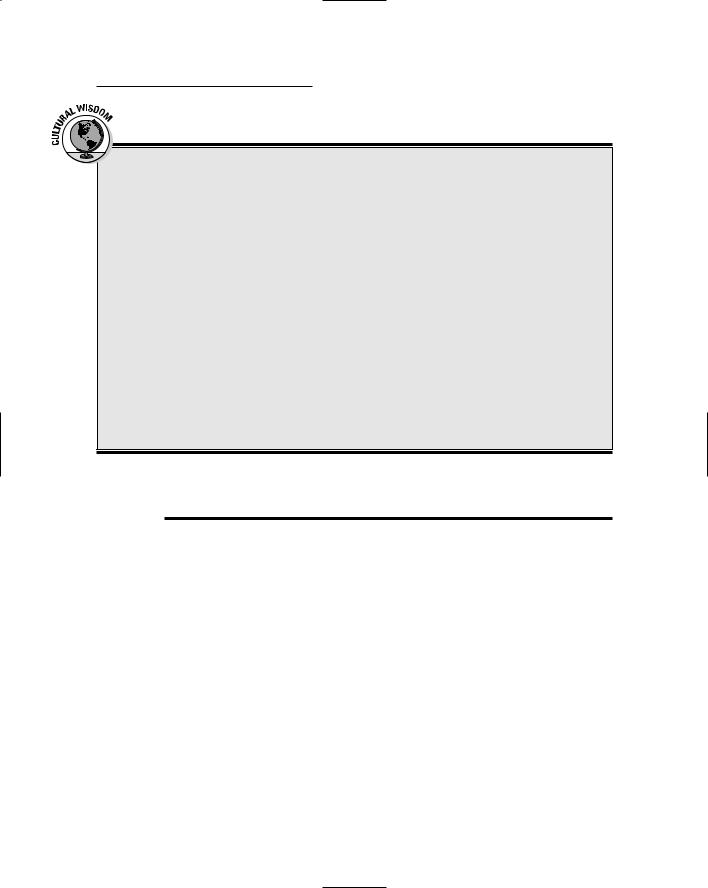
Chapter 10: At the Office and Around the House 183
Family life in a Middle Eastern home
In most Arabic-speaking and Islamic countries, the bayt (bah-yet; home) plays a very central role in family life. Unlike in Western countries, the ‘usra (oos-rah; family) structure in the bayt generally consists of more than the parents and children (the typical nuclear family); it extends to other members of the family, such as grandparents, uncles, aunts, and cousins. Therefore, a bayt in most Middle Eastern countries houses not only parents and their children but also grandparents, grandchildren, cousins, and other family members.
In countries such as Saudi Arabia, manaazil (mah-nah-zeel; houses) are built to accommodate up to 10 or 15 family members and sometimes more. Like houses in the United States,
Europe, and other parts of the world, the Middle Eastern home revolves around the ghurfat alma’iisha (living room). Physically and architecturally, the ghurfat al-ma’iisha is the central part of the manzil; it’s usually surrounded by the maTbakh (kitchen) and the ghurfat al-juluus
(sitting room) and ghurfat al-’akl (dining room). Often times, it’s the largest room in the manzil and is accessible through different ghuraf.
During the ‘iid (eed; holidays), the bayt becomes a place where family members come and celebrate the festivities together. The ghurfat al-ma’i- isha retains its centrality during these festivities, although other parts of the manzil become more significant, such as the ghurfat al-’akl and the bustaan (garden).
Talkin’ the Talk
Hassan can’t find the remote control for the living room television. He asks his mother whether she has seen it.
Hassan: |
hal ra’aytii jihaaz at-tilfaaz? |
|
hal rah-ay-tee jee-haz ah-teel-faz? |
|
Have you seen the remote control? |
Mother: |
kaana fawqa aT-Taawila. |
|
kah-nah faw-kah ah-tah-wee-lah. |
|
It was on the table. |
Hassan: |
‘ay Taawila? |
|
ay tah-wee-lah? |
|
Which table? |
Mother: |
aT-Taawila fii ghurfat al-’akl. |
|
ah-tah-wee-lah fee goor-fat al-ah-kel. |
|
The dining room table. |

184 Part II: Arabic in Action
Hassan looks for the remote control on the dining room table but can’t find it.
Hassan: laa, al-jihaaz laysa fawqa aT-Taawila.
lah, al-jee-haz lay-sah faw-kah ah-tah-wee-lah.
No, the remote is not on the table.
Mother: hal ‘anta muta’akkid?
hal an-tah moo-tah-ah-keed?
Are you sure?
Hassan: na’am. huwa laysa hunaa. nah-am. hoo-wah lay-sah hoo-nah.
Yes. It’s not there.
Mother: rubbamaa huwa taHta aT-Taawila. roo-bah-mah hoo-wah tah-tah ah-tah-wee-lah.
Perhaps it’s under the table.
Hassan: daqiiqa sa’araa taHta aT-Taawila.
dah-kee-kah sah-ah-rah tah-tah ah-tah-wee-lah.
One minute while I look under the table.
Hassan looks under the table for the remote.
Hassan: laysa hunaa ‘ayDHan. man ‘ista’malahu al-’aakhir? lay-sah hoo-nah ay-zan. man ees-tah-mah-loo-hoo al-ah-keer?
It’s not there either. Who was the last person to use it?
Mother: ‘abuuk. ‘unDHur fii ghurfat al-juluus. rubbamaa
‘akhadhahu hunaaka.
ah-book. oon-zoor fee goor-fat al-joo-loos. roo-bah-mah ah-kah-dah-hoo hoo-nah-kah.
Your father. Look in the sitting room. Maybe he took it there.
Hassan: huwa laysa fawqa Taawilat ghurfat al-juluus. hoo-wah lay-sah faw-kah tah-wee-lat goor-fat al-joo-loos.
It’s not on the sitting room table.
Mother: hal ra’ayta fii al-kanaba?
hal rah-ay-tah fee al-kah-nah-bah?
Did you look on the couch?

|
|
|
Chapter 10: At the Office and Around the House 185 |
|
|
|
|
||
|
Hassan: |
qimtu ‘alayhi! |
||
|
|
keem-too ah-lay-hee! |
||
|
|
I found it! |
||
|
Mother: |
‘ayna kaana? |
||
|
|
ay-nah kah-nah? |
||
|
|
Where was it? |
||
|
Hassan: |
kaana fawqa aT-Taawila fii al-maTbakh. |
||
|
|
kah-nah faw-kah ah-tah-wee-lah fee al-mat-bak. |
||
|
|
It was on the kitchen table. |
||
|
|
|
|
|
Words to Know
jihaaz at-tilfaaz |
jee-haz ah-teel-faz |
TV remote control |
tilifizyoon |
tee-lee-feez-yoon |
television |
shaasha |
shah-shah |
screen |
miyaa’ |
mee-yah |
radio |
kanaba |
kah-nah-bah |
couch |
ra’a |
rah-ah |
to look/to see |
qaama |
kah-mah |
to find |
fawqa |
faw-kah |
on/on top/over |
taHta |
tah-tah |
under/below |
bijaanib |
bee-jah-neeb |
next to/adjacent |
muta’akkid |
moo-tah-ah-keed |
sure/certain |
rubbamaa |
roo-bah-mah |
perhaps/maybe |
